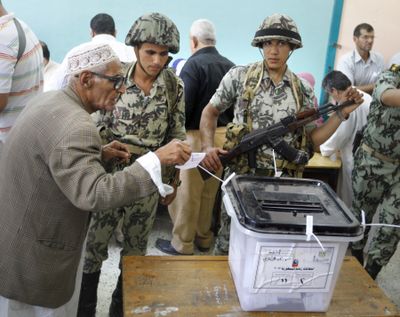Egypt warily votes
Many distrust setup, outcome of runoff

CAIRO – Egyptians began voting Saturday for a new president, but the joy that defined the first round of elections last month had turned sullen, as if they were enduring the final betrayal of a revolution by a ruling military that has manipulated events from the wings for six decades.
The choice they face in two days of balloting is stark and unsettling: Muslim Brotherhood candidate Mohamed Morsi represents an untested political Islam, and Ahmed Shafiq, the last prime minister to serve toppled leader Hosni Mubarak, is an old-guard loyalist whose victory would repudiate the demands for change that fueled last year’s rebellion.
Temperatures were high and turnout was low, amid fear that the runoff would not bring them a new democracy to end months of political unrest and inspire an Arab world in upheaval. Much is uncertain about the country’s fate: A high court last week dissolved the Islamic-dominated parliament, no constitution has been drafted to outline presidential powers, and the army and police intensified patrols and checkpoints across the capital and other cities.
“I am voting today for Morsi, but I know the results,” said Dina El Garf, a young woman from the Cairo neighborhood of Dokki. She said that the military “will never let Morsi win. I know it will be the military’s choice and that is Shafiq. A lot of people did not come out to vote today for this reason.”
Tunisia and Egypt led the revolts that last year swept autocrats from power across the Middle East and North Africa. Tunisia has had a relatively smooth transition to stability, but Egypt has been stifled by echoes from the Mubarak era – a council of generals that for 17 months has allowed a veneer of democracy while retaining all meaningful power.
That dynamic was prevalent in Cairo, where government buildings stood ensconced in barricades and the helmets of riot police gleamed in the sun.
The day felt like an eerie playback of the indifference that used to settle over voting lines during the repressive days of Mubarak. Casting a ballot Saturday seemed an unenviable task for many frustrated by the polarizing choice between Morsi and Shafiq. Neither man symbolizes the spirit of the uprising; their campaigns do not excite liberals, activists and progressive Islamists hoping for a rallying voice to rise from the “Arab Spring.”
“What the institution wants will happen,” said Ahmed Hamdy, referring to the army-appointed interim government. “Both candidates are the wrong choice, but we know who is going to win. It is clear and voting is not going to change that.”
Shafiq would hew closer to the secular law-and-order line favored by the military. But Morsi, a religious conservative, would encounter an army that since independence in 1952 has backed a state that violently crushed attempts by Islamists to turn religious popularity into political clout. Morsi’s authority would be further denuded by last week’s disbanding of parliament, nearly 50 percent of which was controlled by the Brotherhood.